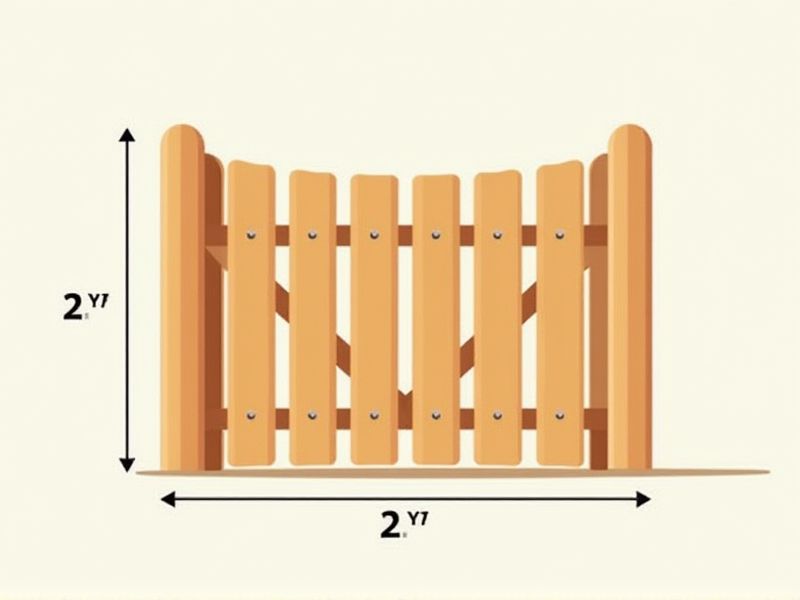
When selecting fence panels, knowing standard dimensions makes planning and installation much easier. Most commonly, fence panels are 6 feet (72 inches) wide and 6 feet (72 inches) high, although heights can also be found in 4-foot and 8-foot options to suit various privacy or decorative needs. If you're working with pre-made panels from a hardware store, these standard sizes help ensure compatibility with posts and gates. Always measure your space carefully, considering panel width and height, to ensure a smooth fit and a professional-looking finished fence.
Height Of The Panel
The standard height for residential fence panels typically ranges from 4 to 6 feet, providing adequate privacy and security. In commercial settings, panels may reach heights of 8 feet or more, depending on the intended purpose and local zoning regulations. A 6-foot panel is often preferred for backyards, ensuring that your outdoor space remains secluded while still allowing natural light. If you require additional height, consider adding extensions or lattice tops, which can enhance both aesthetics and functionality while conforming to local codes.
Width Of The Panel
The standard width of a fence panel typically ranges from 6 to 8 feet. This measurement is crucial for ensuring adequate coverage and structural integrity in various fencing applications. A wider panel, often at 8 feet, can reduce the number of posts required, thus saving on labor and material costs. When selecting your fence panel, consider the overall layout and the specific purpose you have in mind, as width can impact both aesthetics and functionality.
Material Type
Metal fence panels, such as aluminum or steel, offer exceptional durability and resistance to rust, making them ideal for long-term use. On the other hand, wood panels, typically treated for weather resistance, provide a classic aesthetic but may require regular maintenance every few years. Vinyl fence panels serve as a low-maintenance alternative, available in a variety of colors and styles, with a lifespan of up to 30 years. When selecting a fence panel, consider how factors like material type will affect your installation cost and overall performance.
Thickness Of The Panel
The thickness of a standard fence panel typically ranges from 3/8 inches to 1 inch, depending on the material and intended use. A thicker panel, such as those measuring 1 inch, provides enhanced durability and resistance to warping, making it ideal for long-term use in various weather conditions. For residential purposes, a thickness of 3/4 inch is commonly recommended for a balance between strength and cost-effectiveness. Choosing the right thickness not only affects the panel's longevity but also plays a crucial role in security and noise reduction for your property.
Color And Finish
A high-quality fence panel typically features a range of colors and finishes to enhance aesthetic appeal and durability, with options such as stained wood, painted metal, or composite materials. It's essential to choose a finish that not only matches your landscape but also offers protection against weather elements, UV rays, and rot. For example, a UV-resistant coating can significantly extend the lifespan of the paint or stain, ensuring vibrant colors last for years. When selecting your fence panel, consider both the color palette and the longevity of the finish to make a lasting impression in your outdoor space.
Design And Style
Design and style are critical in selecting appropriate fence panels, as they significantly impact your property's aesthetic appeal and functionality. Standard fence panels typically range in height from 3 to 8 feet, offering versatility for privacy, security, and decorative purposes. Materials such as wood, vinyl, and metal each present their unique design characteristics, influencing durability and maintenance requirements. By choosing the right style, such as picket, privacy, or ranch, you can enhance your landscape while ensuring compliance with local zoning regulations.
Weight Capacity
A standard fence panel commonly supports a weight capacity of approximately 150-200 pounds per linear foot, depending on material and design. Most panels utilize durable components like pressure-treated wood, vinyl, or metal, which significantly contribute to their strength and longevity. For residential areas, a height of 6 feet is typical, providing adequate privacy while maintaining structural integrity. Ensuring proper installation and regular maintenance can enhance the longevity and performance of your fence panels.
Installation Method
When considering fence panel installation, the standard methods include the use of concrete posts, wooden stakes, or metal brackets, which can significantly affect stability and longevity. Generally, you should allow a depth of at least 2 feet for posts in the ground, ensuring they remain secure against wind and weather. Opting for a pre-assembled fence panel can reduce installation time to approximately 20% compared to building panels from scratch. Proper spacing of 6 to 8 feet between posts is crucial to maintain an even structure and discourage sagging over time.
Post Spacing
Post spacing for fence panels typically ranges from 6 to 8 feet apart, ensuring optimal stability and support for various fence types. A standard 4x4-inch post is commonly used for residential fences, providing sufficient strength to withstand wind loads and other environmental factors. For added durability, consider using treated wood or metal posts, which can last up to 25 years with proper maintenance. Ensuring the right spacing and post material can enhance the longevity and aesthetic appeal of your fence.
Durability And Weather Resistance
When selecting a fence panel, prioritize durability and weather resistance to ensure a long-lasting investment. Look for materials such as vinyl or treated wood, which can withstand harsh conditions, with some panels offering warranties of up to 25 years. You might also consider thickness measurements, as panels with a minimum thickness of 6mm tend to resist bending and warping. Regular maintenance, including cleaning and sealing, can enhance the lifespan and appearance of your fence, making it a worthwhile commitment for your property.
